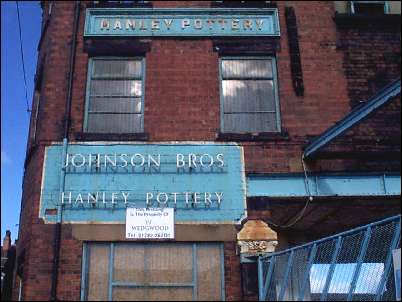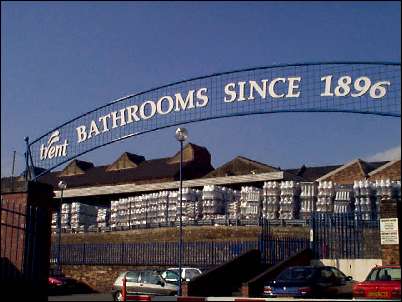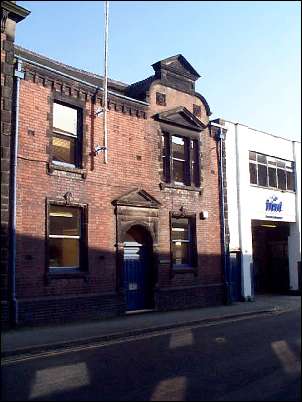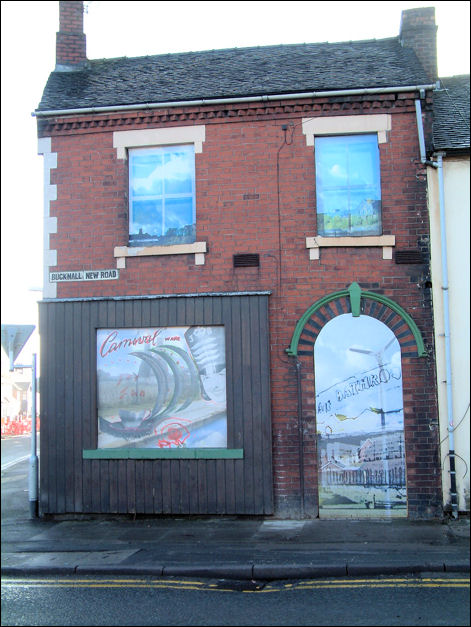"Founded in 1883 by four brothers, Henry,
Robert, Alfred and Fred Johnson. The business was at first on a modest
scale, but in the last 70 years has expanded until today Johnson Bros. is
probably the largest firm of earthenware manufacturers in the world,
controlling a number of factories in England and abroad. The present head
of the firm is Sir Ernest Johnson.
Starting with the production of 'Granite' for overseas markets, the firm
has developed in the twentieth century fine self-coloured bodies, Gray
dawn in 1929, followed by Rose, Green and Golden dawn. A new shape has
been made each year. Finley engraved table wares are a specialty, 'Old
Britain Castles' engraved by Fennell being one of the most notable.
The potting of this firm is distinguished by uncommon lightness and
finish."
Pottery and Glass, March 1946.
Johnson Brothers were taken over by
the Wedgwood Group and in 2003 manufacturing ceased in the
UK and was moved to China and Indonesia.
Johnson's had three works in the Eastwood area of Hanley,
Stoke-on-Trent. Now these are all demolished and the area cleared for
canal side housing.

The old Johnson Imperial Works
photo: Oct 1999

The entrance to the Johnson Brothers'
Hanley Pottery
photo: Jan 2001


Frontage of the Johnson's Trent sanitary
ware works on Eastwood Road
photo: Sept 1999

Johnson Brother's images incorporated in the art
work
photo: Jan 2009
"ARTWORK has been plastered on to the doors and windows of
empty homes earmarked for demolition.
The images of canals, pot banks and parts of Hanley have been fixed to
five terrace homes in Bucknall New Road.
The homes are expected to be demolished by Government agency Renew North
Staffordshire before the end of March.
Pupils at two Hanley primary schools – Waterside and St
Luke's – have created the images, which have been attached to five £100
hoardings. These will be moved to other houses along the street as the
clearance work continues.
Artist Cora Glasser, who is co-ordinating the project for Derby-based
Glassball, said: "We held a couple of workshops in schools and got input
from lots of residents in the area.
"We also worked with members of a
luncheon club to gather their memories, which are printed on the
pictures.
"This project is much more than just making an image – it's about
appreciating the history and the future of this area.
"We have used lots of wonderful views of the canal, pot banks and the
scenes the children can see from their schools."
The clearance work will see Renew demolish dozens of homes
and businesses along one side of Bucknall New Road.
Renew programme manager Nick Newman said: "We are moving
from the disruptive period of this regeneration to a more positive time.
"We do not want to give the
impression that the houses are not cared for, so the artwork makes it
look better. It's not very expensive and can be reused and it makes a
difference."
City councillor Adrian Knapper, portfolio holder for economic
development, said: "We're trying to get away from the stereotypical
image of clearance areas being empty and uninviting places.
"This is an open art gallery for the city which has involved the people
living here."
Residents on the opposite side of Bucknall New Road said they were pleased
to see the artwork but sad houses were coming down.
Debbie Haynes, aged 48, said: "The artwork is better than the black
railings and grills there before.
"It's great to see children's work displayed like this.
"These houses are going to come down eventually, but until then this is
probably the best thing they can do.
"I'm looking forward to the new houses being built, but it has come at a
price.
" This was a very close-knit community and I don't think they will ever
get that sense of community back."
The Sentinel newspaper - January 2009
![]()